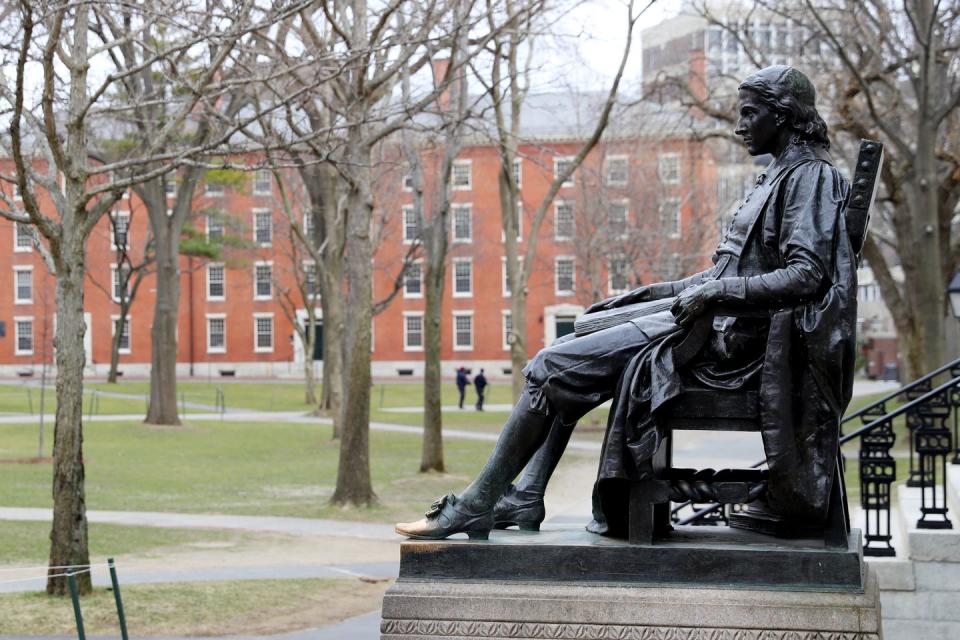How Ivy League Students Learned to Game the Grading System

"Hearst Magazines and Yahoo may earn commission or revenue on some items through these links."
Last month, the dean of Yale College presented a report concerning student transcripts to faculty. The data was extraordinary: out of all the grades dished out to students during the 2022-2023 school year, about four in five were A’s or A-’s.
Headlines soon followed in the school’s student-run newspaper and even The New York Times, which asked whether the first letter in the alphabet carried any weight anymore.
Since the 1980s, grade inflation has been persistent across higher education, especially at elite universities. But in recent years, A-range grades have spread like wildfire—and not just amongst the Bulldogs. Students at Harvard College receive a similar percentage of A-range grades. Transcripts have become so uniformly great that some top companies are enlisting consultants to sort the true brainiacs from those who have gamed the system.

“They would like to be more efficient in their employee selection process and so they consult with me as to what these grades mean,” Stuart Rojstaczer, who has consulted for two Fortune 500 companies, says. “I tell them that at these elite schools, they have a defacto pass-fail system and you should look at anything less than an A or an A-minus as a fail.”
Rojstaczer worked as a professor of geophysics at Duke University from 1990 until the early aughts. But despite winning numerous academic awards, including the National Jewish Book Award for his 2014 novel The Mathematician’s Shiva he has garnered the most enduring attention for his work on grade inflation. Over the last two decades, he has written numerous research papers on the topic—and become a go-to expert on all things letter grades in the process. “It's like a baseball fan having obsession with statistics,” he says of people’s fascination with the subject. “If you're interested in higher education, you seem to be obsessed with GPA.”
Rojstaczer has been able to monetize his niche by working with employers disappointed in their fresh-out-of-college hires. While he does not review individual applications, he does offer guidance on how to read the "guts" of a transcript, including how to interpret class selection and performance over time. For the latter, he encourages HR departments to not write off students who have had dips. One bad semester may have brought a student’s GPA down, he says, but “their mom could’ve died.” And when you see grades rebound, that's a positive.

Students at highly-selective colleges expect, and sometimes enjoy, competition at school, but for those hoping to land a handsomely-compensated gig at an investment bank, the hamster wheel doesn’t stop until job recruiting finishes. Achieving high-marks boosts their chances of getting the job.
And so begins the whisper network. This class is an easy A. That class is all take-home tests. What was once word-of-mouth gossip inevitably moved to the digital realm. In 2011, Harvard’s student newspaper’s blog published a “10 Easy Classes” list based on the school’s course evaluation guide (Drama 110: "Beginning Acting" made the cut).
One Harvard junior who asked not to be named says students give low-workload classes a name: gems. “It's usually more of a conversation about classes that are just requirements people are knocking out as opposed to what they're actually really interested in.”
Not all classes earn gem status because they’re easy. Earlier this year a Harvard math and statistics major created the website HUGems.net, which shows the upcoming semester’s classes with high overall course evaluation ratings and organizes classes by “Super Gems” and “Hidden Gems.” It includes estimated workload per week plus selected comments from web-scraped reviews. “Super mega chill gem and you will learn so much just by listening in lecture,” one person wrote about “World Health Challenges and Opportunities.” That class, according to the site’s estimate, requires an estimated 3.71 hours per week of work.
But the online course evaluations may have a downside. “It seems to give students more of an obsession to try to pursue the highest GPA possible. If that data weren't available, maybe they would worry less about trying to eke out the last hundredth point in their graduating GPA,” Rojstaczer says.
Job recruitment has been one of the main barriers to the push to deflate grades. When Princeton moved to cap the number of A's professors handed out nearly two decades ago, some students worried that employers would pick students at other schools over them. The school later ended the deflationary practice.
Amanda Claybaugh, Harvard’s dean of undergraduate education, told the Times in early December that deflating grades might hurt their students as they pursue their first job in the workforce. “We don’t want to move alone,” she told the paper. “We don’t want to disadvantage our students.”
Indeed, according to Rojstaczer, one common practice amongst employers is to impose GPA cut-offs. If the GPA dips below a certain number, the company won't even consider a student's application. Outside of the job market, GPAs are also a tool for graduate programs to assess students and departments to award honors. But Rojstaczer points out that those numbers are typically supplemented with letters of recommendation from professors.
Despite his fascination with GPAs, Rojstaczer, who has hired multiple students, says he doesn’t look at the number as a valuable hiring tool. And the recent media attention to grade inflation may bring positive change, including the prospect of universities doing away with grades altogether. “I don’t think that any quantitative measure, whether it is a standardized test score or a GPA, is a good barometer for me whether that person will be able to work with me in a congenial productive way. The only way I really know is to bring them in and interview them,” he says. “You’re going to see nationwide, not just the de-emphasis of grades, but an abandonment of the system,” he adds. “It’s no longer measuring anything of value.”
You Might Also Like

